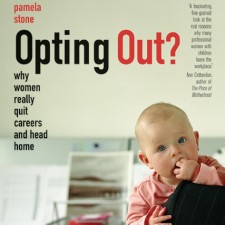
Do women “choose” to leave science, or does the daily grind of discrimination, lose-lose tradeoffs, and culture clashes drive us away? Do we opt out, or are we pushed out, to use the language of sociologist Pamela Stone? The data are still rolling in, but today in Science, we show how the more popular opting-out account obscures the more likely gender-bias explanation–even in Science publications. [pdf]
As cultural psychological research shows, middle-class European Americans readily cite personal choices as the cause of people’s actions, but are slower to see how situational affordances and constraints shape behavior. This “choice bias” arises from the European American cultural understanding of people as independent, autonomous, and in control. In contrast, most other cultures of the world understand people to be interdependent, connected, and constantly adjusting to their situations.
We and our colleagues recently caught the insidious “choice bias” at work in a Science publication called Science Careers, which targets young scientists on the hunt for jobs. Today Science published our Letter pointing out the bias, as well as the response from the journalist who penned the original article. Kudos to Science for publishing both Letters, for together they illustrate how even well-meaning and well-informed people often fail to recognize the choice bias and its insidious effects.
Also, many thanks to our coauthors: Karen S. Cook, Shelley J. Correll, Corinne A. Moss-Racusin, Carol B. Muller (who brought the Science Careers article to our attention), Jennifer L. Raymond, and Caroline Simard.
I agree with this assessment of the distinction between inter-dependents and independent world views and see it as the biggest blind-spot of living in the Western world. So much of our identity, and in some cases arrogance, is based on the elevation of choice as the noblest quality. In other words, “We judge by reality and freedom of choice. You judge by close mindedness and ignorance,” Nevertheless secularist can be totally unaware of the influences that have shaped their choices. It is an unending cycle of seeing oneself as being in control while others are seen as slaves to their traditions and social mores. This is evident in the clash between people of faith and those holding to secular values. Secularist seem to imply the religious are inherently less advanced because they are bound to the old ways, while they as enlightened skeptics have risen above the “sheeple”. I think this is at root of the clash between secular and non-secular debates like evolution, sex education, etc….
When speaking on the affect the entire scientific community has on its prospective scientists, researchers, etc., it makes sense to take into account situational factors. For instance, if a female doctoral candidate is constantly walking into to rooms of all male panels to defend her research findings, what message is that sending? Everyone in charge of her future is a male, everyone who is guiding her further education is a male. This is not to imply that the sex of her superiors makes the process inherently more difficult, but what it does communicate is that her position is not common and there is a status quo to maintain. Although this individual certainly chose to break into a field that is male-dominated, the community at large puts additional pressure on the female to prove she is up to par with the males because as of yet, there have been few demonstrations that women are as capable in the sciences as men are. The socialization of females begins earlier on than when a doctoral candidate sets foot into the room. From the time we are born, males and females are put in vastly different environments, like if our rooms are pink or blue. As newborns, it’s hard to argue in favor of individual choice when the decision for gender-specific room color was hardly up to us.
I agree that often well-meaning and well-informed people fail to recognize the choice bias and its effects not just with gender but also with race/ethnicity. We are more incline to blame the individual for their current situation without taking into consideration the systems and institutions that restricts them; without thinking of how “situational affordances and constraints shape [their] behavior.” I wonder if it’s because it is easier to blame them entirely than to admit that some of the blame is ours. Because if we are also to blame, then we would need to do the work that is necessary to make changes to the systems/institution and ultimately ourselves. We would have to change our ideologies and our everyday practices and habits. We would have to acknowledge the role we play and the impact we have. Don’t get me wrong, I believe that people need to take responsibility for the actions that brought them to the places that they are in life. However, we have to acknowledge that sometimes there are restricts/constraints for the person who would like to make a change. We also have to understand that people are constantly adjusting to their situation, therefore their behavior might be the direct result of their situation or their behavior is constantly being shaped by their situation.